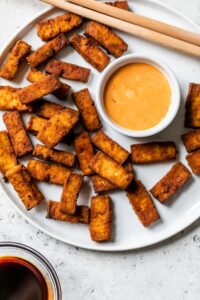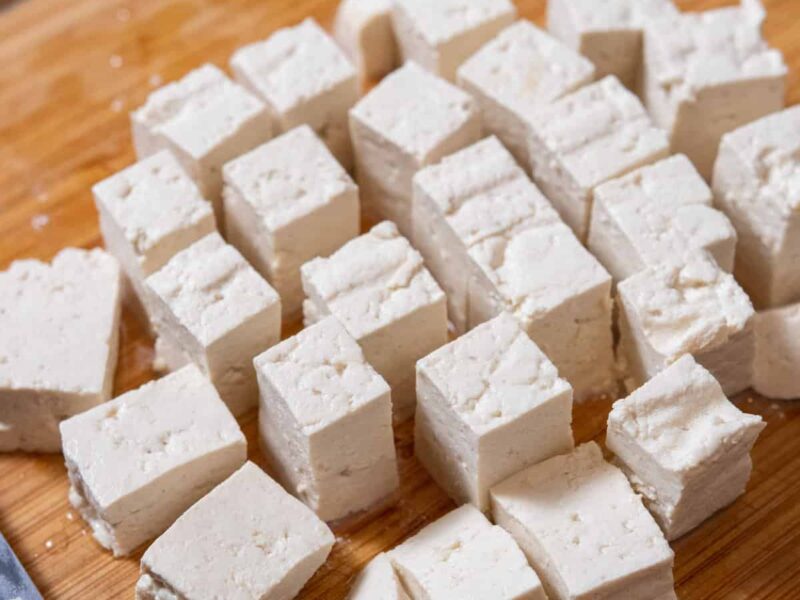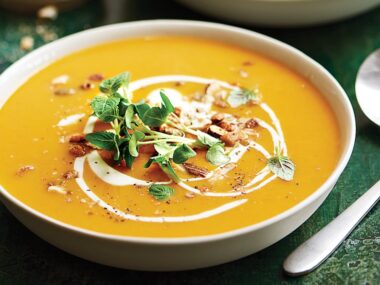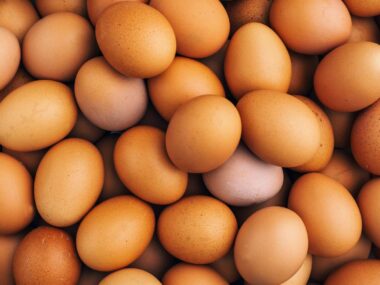Tofu, also known as bean curd, is a versatile and nutritious food made from soybeans consumed for centuries in various parts of the world, particularly in East Asia. With its mild flavour and adaptable texture, tofu has gained popularity as a staple ingredient in vegetarian, vegan, and omnivorous diets alike.
In this essay, we will explore the origins, production process, nutritional benefits, culinary uses, and cultural significance of tofu, highlighting its role as a sustainable and protein-rich food source in modern cuisine.
Origins and Production Process
Tofu has its origins in ancient China, where it is believed to have been invented over 2,000 years ago during the Han dynasty. The production process of tofu begins with soaking soybeans in water, grinding them into a fine paste, and boiling the mixture to extract soy milk.
The soy milk is then coagulated using natural coagulants such as calcium sulfate or magnesium chloride, which cause the proteins in the soy milk to curdle and form a solid mass. The resulting curds are pressed into moulds to remove excess moisture, resulting in the formation of tofu blocks of varying firmness.
Nutritional Benefits
Tofu is prized for its nutritional profile, as it is rich in protein, essential amino acids, vitamins, minerals, and phytochemicals. It serves as an excellent source of plant-based protein, making it a valuable addition to vegetarian and vegan diets.
Tofu is also low in saturated fat and cholesterol and contains no cholesterol, making it a heart-healthy alternative to animal-based proteins. Additionally, tofu is a good source of calcium, iron, magnesium, phosphorus, and other micronutrients essential for bone health, muscle function, and overall well-being.
Culinary Uses
Tofu’s mild flavour and adaptable texture make it a versatile ingredient in various savoury and sweet dishes. In its uncooked form, tofu can be blended into smoothies, salad dressings, and dips to add creaminess and protein. When cooked, tofu can be fried, grilled, baked, or steamed, taking on the flavours of marinades, sauces, and seasonings to create delicious and satisfying dishes.

Soft or silken tofu is often used in soups, stews, and desserts for its smooth and custard-like texture. Firm or extra-firm tofu is ideal for stir-fries, curries, sandwiches, and salads, as it holds its shape well and absorbs flavours readily. Tofu can also be crumbled and used as a meat substitute in dishes such as tacos, lasagna, and chilli, providing a nutritious and eco-friendly alternative to ground meat.
Cultural Significance
Tofu holds significant cultural and culinary importance in East Asian countries such as China, Japan, Korea, and Vietnam, where it has been consumed for centuries as a dietary staple. In Chinese cuisine, tofu is used in many dishes, from mapo tofu (spicy tofu with minced meat) to douhua (soft tofu dessert). In Japanese cuisine, tofu is enjoyed in dishes such as agedashi tofu (deep-fried tofu in dashi broth) and hiyayakko (chilled tofu with toppings).
Tofu is also valued for its versatility in vegetarian and vegan cooking, where it serves as a plant-based alternative to meat and dairy products. In recent years, tofu has gained popularity in Western countries as a nutritious and sustainable food option for individuals seeking to reduce their meat consumption and adopt a more plant-based diet.
Health and Environmental Considerations
In addition to its nutritional benefits, tofu offers several health and environmental advantages compared to animal-based proteins. Tofu production requires fewer natural resources, such as water and land, and produces fewer greenhouse gas emissions compared to livestock farming.
Tofu is also free from antibiotics and hormones commonly used in animal agriculture, making it a safer and more sustainable protein choice for consumers concerned about food safety and environmental impact.
Conclusion
Tofu, with its origins dating back thousands of years, has emerged as a versatile and nutritious food beloved by people around the world. From its humble beginnings in ancient China to its widespread popularity in modern cuisine, tofu has cemented its place as a valuable source of plant-based protein and a staple ingredient in vegetarian, vegan, and omnivorous diets alike.
With its mild flavour, adaptable texture, and culinary versatility, tofu continues to inspire creative and delicious dishes that nourish both body and soul while promoting health, sustainability, and cultural diversity on a global scale.
Related Tags
Taiwo Olawuyi
Taiwo Olawuyi is a highly dedicated and passionate professional blogger, renowned for her ability to create captivating, informative, and engaging content in the realm of health and wellness. She holds a Bachelor's degree in Political Science from Olabisi Onabanjo University and a Master's degree in Adult Education from the prestigious University of Ibadan. Her profound passion for health and wellness, coupled with her unwavering dedication to her audience, serves as a constant source of inspiration and enlightenment for readers worldwide.










